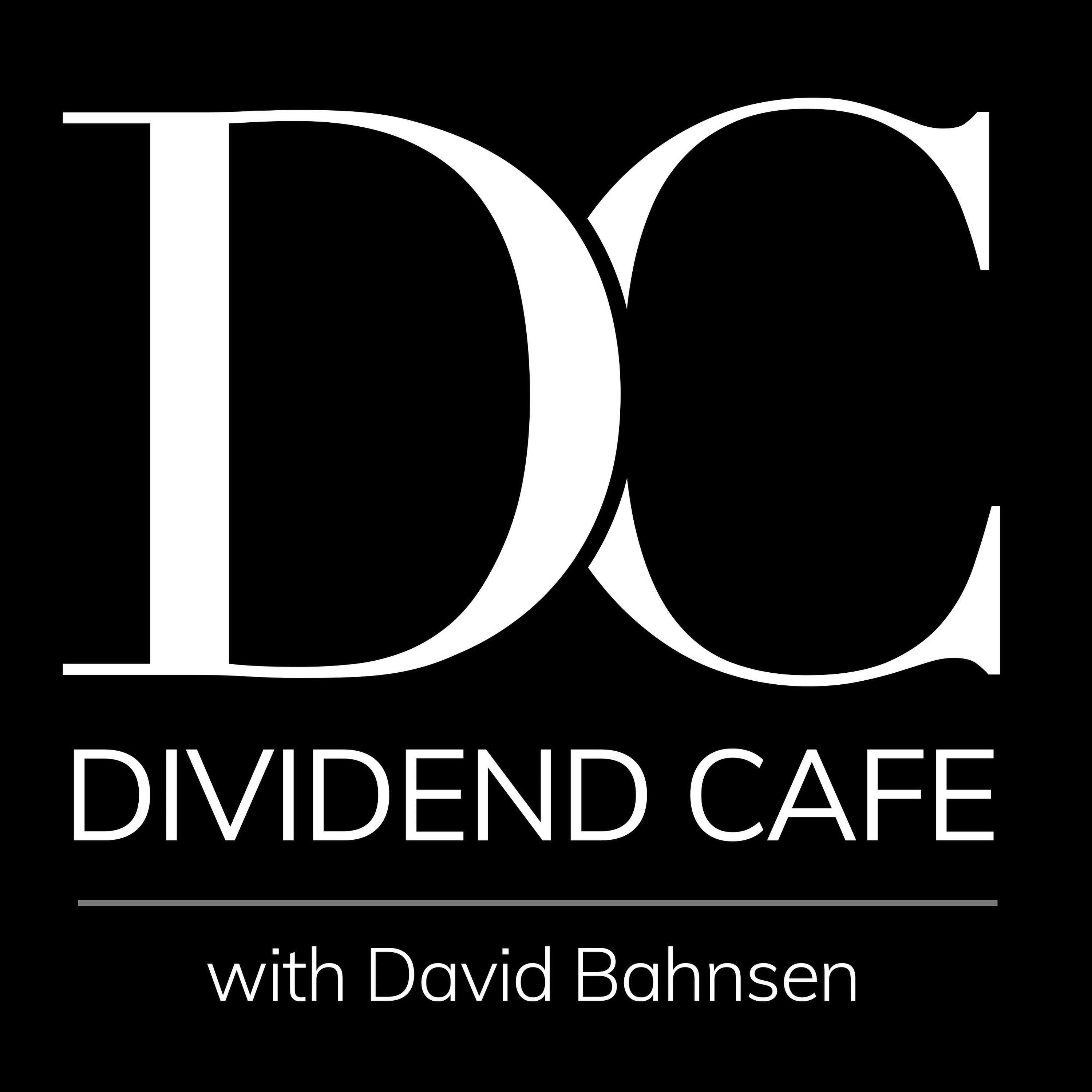Dear Valued Clients and Friends,
Believe it or not, this first Dividend Cafe in over 14 years that I did not write is not a by-product of my Christmas week schedule. I asked our guest writer to write something for Dividend Cafe a couple months ago, and here we are. I happen to adore his writing and track with his thinking which makes it a lot easier, of course. If we incorporate more guest writers for Dividend Cafe next year, it will be special, additive editions (mid-week), so you are still stuck with me for the Friday Dividend Cafe. But in the meantime, be of good cheer – today’s Dividend Cafe has a message you need about the future of work!
John is the editor of RealClearMarkets.com and author of numerous books on work and economics.
“You could supply me with the world’s best instruction, and I could endlessly strive to improve my skills. But, alas, on the gridiron or basketball court I would never command even a minimum wage.” – Warren Buffett
Jakey Boehm goes to bed every night at 10 p.m. So far, so normal. The difference for Boehm is that he regularly has upward of a million people watching him on the way to slumber. Boehm streams his going-to-bed routine, along with the sleep that follows. Most notable of all is that Boehm is paid for his nightly performances to the tune of $35,000/month. In the modern world sleep is a profession for some, and a lucrative one at that. It turns out viewing an expert preparing for and achieving sleep enables better rest for those watching.
Where it gets interesting is that in the early part of the 21st century there aren’t just professional sleepers. There are also “sleep coaches.” They’re particularly popular in the sports world. For Super Bowl LII in Minneapolis, the New England Patriots brought no fewer than three sleep coaches to help the players maximize their performance. Nice work if you can get it, and rest assured that sleep as a job is in its infancy. In time, work that connotes with immense joy will be common. How things have changed.
To offer readers a sense of just how much things have changed, it’s useful to travel back in time to the closing decades of the 19th century. If you were born then you had 50/50 odds of becoming a farmer once able-bodied. This was true even in the booming United States. For the vast majority of those born then, their career path in life was set from an early age: they would spend six days per week in a backbreaking pursuit of enough food to survive. Not infrequently they didn’t produce enough.
As Alex Epstein reports in his 2022 book Fossil Future, starvation was very common in the 19th century. Getting into specifics, he writes that it was not uncommon for humans to be found in the countryside “with their mouths full of grass and teeth sunk into the earth.” The simple truth is that before the Industrial Revolution, “Robber Barons,” and other alleged miscreants who oversaw massive production leaps, the vast majority of human endeavor was directed toward the creation of food. As evidenced by fairly common starvation, and the abject fear formerly expressed by soon-to-be parents about “another mouth to feed,” what demanded the lion’s share of human exertion to produce did not result in very much nourishment.
Thank goodness for machines, or more realistically, robots. Yes, thanks to advances like the tractor, fertilizer and the backhoe, exponentially fewer hands were eventually required to produce exponentially more food. In that case, let’s think of the aforementioned advances as easily the biggest job destroyers in the history of mankind. Hard as it is to imagine, the U.S. economy was largely defined by farming and work related to farming well into the 20th century. As the late George Melloan reported in his 2016 book When the New Deal Came to Town, the 1920 U.S. Census indicated that “people living on farms or in rural towns serving the farm community comprised 48.8 percent of the American population.” What a different country the U.S. was! To say professional sleepers and sleep coaches didn’t exist 100 years ago is a blinding glimpse of the obvious. But we’re getting ahead of ourselves.
What’s important for now is that far from placing us in breadlines, the technological advances that relentlessly destroyed the employment of so many propelled those displaced by technology to much better work. With food more and more a given, a growing number of Americans could pursue medicine, education, finance, and all manner of other forms of unemployment that a formerly food-focused world previously lacked the time for.
Please stop and think about the above truth. And in thinking about it, please contemplate how meaningful the erasure of farm work was for so many. In my case, it’s impossible for me to not be immensely grateful for having been born in the 20th century. For one, nothing about my skill set signals a facility for agriculture work. Had I entered the world in the 19th century, it’s not unreasonable to suggest that I would have been viewed as lazy, not terribly bright, and surely a weak link on a working farm that would wholly obscure the talents that I came into the world with.
Luckily I was born later. It meant I had choices. From the time I was old enough to think about it, I got to think about what I would be when I grew up. As a child I had designs on professional football, surely basketball, politics (President of the United States, of course…), film director, actor, lawyer, investment banker, laundromat owner (all-cash business!), hotelier (I was even accepted to Cornell’s School of Hotel Administration), musical star, and countless other pursuits. These thoughts were very much a modern luxury! Which is the point.
Thanks to staggering advances in the productivity of humans, the range of ways that one could earn a living exploded. What drove this advance? Certainly oil’s discovery as energy in the 19th century loomed large. Stated simply, oil powered all manner of machines on the way to the introduction of millions and billions of automated “hands” into the workforce. These extra hands once again didn’t render the world’s workers jobless as much as they made those working quite a bit more skillful while working.
To see why, consider what Adam Smith reported on in the opening pages of The Wealth of Nations in the late 18th century. Smith wrote of a pin factory that he visited, and noted how one man working alone in the pin factory could maybe – maybe – produce one pin per day. But several men working together in that same factory in specialized fashion could produce tens of thousands on a daily basis.
Work divided is the path to gargantuan leaps in productivity born of more and more people doing what they do best. All of which hopefully vivifies why robots and other forms of automation are always and everywhere wondrous advances that elevate us humans as we work. It’s the pin factory described by Smith multiplied countless times over as humans working in concert with increasingly dexterous machines produce more and more. What’s crucial about all this is that mechanization of so much production continuously makes life’s necessities a foregone conclusion, but even better, it has rendered luxuries like the automobile, flight and computers former luxuries in rapid fashion.
Contemplating all this, is it any wonder that a U.S. economy that was once defined by farming, followed by manufacturing, is one that rapidly morphed into a “service economy”? The previous question hopefully answers itself. Abundance made it possible for more and more people to enjoy living that was no longer defined by a daily struggle just to stay alive. With more free time that was a direct consequence of skyrocketing supply of what was once scarce, we could focus on our finances, our health, our entertainment, and countless other pursuits that the vast majority of those living in the 19th century never had the time or means to imagine. Myriad jobs emerged from this abundance yet again. People had surplus and they wanted to be served by bankers, doctors, stockbrokers, teachers, actors, writers, and myriad others whose genius was unearthed by prosperity.
It’s all yet another reminder that work-erasing technology doesn’t put us out of work as much as it makes us geniuses at work. Consider the former ubiquity of farm work once again. What a cruel existence; one that likely marked all-too-many smart and talented people as lazy and worthless. Looked at through the prism of 2022, it’s ideally apparent to Bahnsen Group clients that no one is lazy or stupid as much as a lack of economic growth stupefies and idles a lot of normally brilliant people.
All of which brings us to the quote that begins this piece. How incredibly fortunate that Warren Buffett was born in 1930 instead of 1830.
None of this is to say that he couldn’t have pursued a career as an investor in the 1830s, but it is to say that Buffett getting to do what so perfectly elevated his unique skills was a great deal less likely a hundred years before he was born. Not only were savings in search of investment returns quite a bit scarcer, the fact remains that asset allocation, doctoring, lawyering, teaching, and writing were largely professions that followed the successful act of merely feeding ourselves.
In Buffett’s case he’s making a humble statement about his limited athletic skills and how he most definitely wouldn’t be Warren Buffett if the U.S. economy were very narrowly a “sports economy.” At the same time, Buffett is making a much bigger, much more crucial point that limited work opportunity tragically suffocates all manner of genius. What’s exciting, however, is that growing abundance signals more and more previously undiscovered talents finding market applications in a world where necessities and luxuries are a foregone conclusion. And we’re already seeing this right now.
Indeed, it’s not just that “sleep” and “sleep coaches” are real, and well-paid vocations. Jobs in the video game sector are similarly exploding. To be clear, the jobs aren’t just for game designers with engineering degrees from top schools. Currently the National Basketball Association can claim a 25-team league of video game players who, at NBA 2K’s inception earned $35,000 starting salaries, were given housing stipends, relocation bonuses, etc. All for doing something they grew up playing.
Important about all this is that NBA 2K compensation is positively Dickensian relative to pay at the League of Legends level of videogaming. The “players” in this space can claim earnings in the seven figures, and precisely because they can, “video game coach” is now – yes – a profession. And a well-paid one at that.
Of course, it’s all a consequence of aforementioned abundance that enables more and more of us to enjoy life rather than merely hang on for dear life. With individual productivity and the compensation that associates with productivity always ascendant, people have leisure time that they formerly didn’t. And as evidenced by the soaring popularity of internet sites like twitch.tv (a streaming site for video gaming matches that pulls in more viewers than WWE.com, MLB.com, and ESPN.com combined), one of the most popular activities that we engage in when we’re not working is as spectators of those doing what they love for pay.
Or, consider cooking. Not too long ago “chef” wasn’t even a professional designation. It was a dead-end job. But in a world increasingly defined by staggering wealth in concert with the wealthy “outsourcing” their nourishment to others, “chef” has become a worthy, rather prestigious alternative to doctor, lawyer and banker. At which point the kitchens at restaurants expand in specialized fashion in much the same way that automobile factories did 100 years ago. Tour any high-end restaurant kitchen today and there’s a pastry chef in addition to chef and sous chef, a sommelier, a “coffee concierge,” and all manner other narrow pursuits that reward skills that not too long ago had no practical application.
Some who aren’t chefs, or designers, or makeup makers have found lucrative careers merely talking about all four, and many more. We call these individuals “influencers.” Yes, the pay is grand for those who find joy in featuring their consumptive likes and dislikes to a base of followers that grows and grows as leisure time does.
Put in exciting terms, the view here is that we’re on the verge of exiting the “service economy” for what I predict will be called the Entertainment and Life Economy. Just as expert sleepers and video gamers can find remunerative employment, so will a great deal more achieve expertise and the description of “genius” by virtue of us doing for a job what they can’t get enough of. Sunday nights will no longer have melancholy qualities simply because what follows rest will be passion. Work won’t be work as much as it will be a reflection of our unique genius that had formerly been hidden.
To be clear about work that excites our passions, it won’t just be what some will refer to as surface jobs of the sleep, video gamer and “influencer” variety. Never forget that what relieves us of former toil frees our minds and hands to showcase not just unique genius, but also fix what’s wrong with the world around us. At present cancer and heart disease kill too many people, and so do car accidents. Prosperity is the biggest enemy of death and disease simply because prosperity produces the resources that fecund minds require to turn today’s killers into yesterday’s afterthoughts. Considering car accidents, it’s ever more apparent that technological advance will automate transportation in ways that compassionately reduce human error from the roads.
A hundred years ago John Maynard Keynes feared growing abundance, and how it might render us idle. The view here is that Keynes got things backwards. Contra his pessimism, there’s Tamny’s Law: Laziness decreases as prosperity increases, expanding the range of work options so that every person can do the work that most accentuates his or her individual talents. Please keep the arguably pretentious mention of a “Law” in mind as the global economy evolves, and with it talk of four-day workweeks, among other things. No doubt we’re on the verge of the latter already, and some would say it’s already here. Crucial about a six-day workweek on the farm shrinking to four in the Entertainment and Life Economy is not that we will work less, but that the passion we’ll have for work will mean that we’re rarely idle. Doing what we love, and working very productively because we’re doing what we love, we will demand more and more leisure and entertainment that we’ll enjoy while never turning off the fun – yes, the fun – that will be referred to as work.
The bet here is that retirement becomes a dated concept as men and women instead pursue a variety of careers amid living standards that will make the present appear deprived by comparison. Basically we’ll work because we can’t not work, but we’ll do this amid longer and healthier lifespans that will be filled with abundant travel, dining, entertaining, and being entertained. From an investment perspective, hoteliers, restaurateurs and producers of comfort will soar, but the consumptive economy will soar precisely because the productive side of the economy born of passionate, specialized people will continue to astound us.
Call it trite, but our ability to progress is limitless so long as the barriers to production and division of production are kept low. Progress will beget work that so reflective of varied talents that laziness will become a dated notion too. In short, the future of work is beautiful.
* * *
And with that, a very Merry Christmas to you and yours. January 6, the first Friday of 2023, will bring the annual year-in-review/year ahead Dividend Cafe (white paper). It’s a special time of year, and I am so grateful for you all.
With regards,
David L. Bahnsen
Chief Investment Officer, Managing Partner
The Bahnsen Group
www.thebahnsengroup.com
This week’s Dividend Cafe features research from S&P, Baird, Barclays, Goldman Sachs, and the IRN research platform of FactSet. This document and the materials contained herein were created for informational purposes only; the opinions expressed are solely those of the author(s), and do not represent those of Hightower Advisors, LLC or any of its affiliates.












